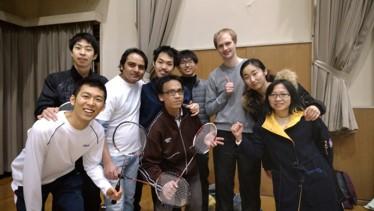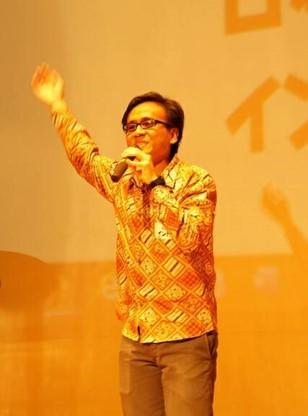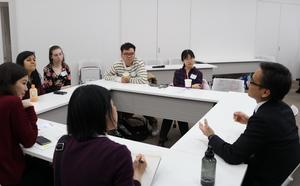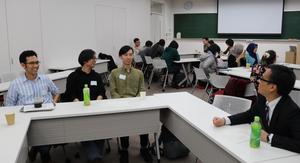Division for International Research and Educational Cooperation
Graduate School of Science and Faculty of Science , Tohoku University
Home > Voices from Alumni > How I found a job in Japan (Dr. Indra Kusuma, Class of 2018)
Voices from Alumni
How I found a job in Japan (Dr. Indra Kusuma, Class of 2018)
DiRECT invited Dr. Indra Kusuma, IGPAS alumnus (Class of 2018) to be one of the guest speakers for IGPAS Gathering 2020.
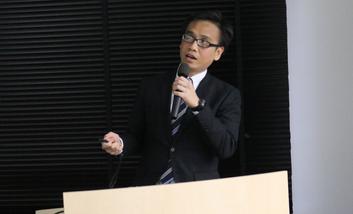
Dr. Indra Kusuma came to Sendai from Indonesia in September 2012 to join IGPAS. Right after graduation in March 2018, he jumped into the business world in Japan. His success in obtaining a position in one of Japan's prominent companies in such a short period (in less than two months!) surprised everyone. How did he do it? And coming from a non-kanji-using country, how did he become so competent in Japanese? At the gathering, he talked about the secrets of his success and motivations for him to carry on his colorful and passionate life, which impressed all the audience.
|
Dr. Indra Kusuma |
| << Presentation >> |
- Profile of his company and his current work
DIC is a fine chemicals company with a top share in printing inks, etc., and Dr. Indra works for its Central Research Laboratories in Chiba prefecture as an "S-rank (with Ph.D.)" research engineer.
He sees it as a "traditional Japanese type" company with global managerial policy and diversity promotion. His current work is to develop organic pigments for color filters. Since he and his colleagues are responsible for blue pigments, they are called "team blue."
- Enduring hardship: to change impossible into possible
At the beginning of 2017, a tragedy hit his family in Indonesia. While trying to console his parents as much as he could, he himself was sad and devastated. He lost interest in his future, let alone in job hunting. Moreover, his mind was full of negative thoughts, such as "my Japanese is not good enough", "I don't know anything about Japanese companies and Japanese job-hunting manners", "Ph.D. holders are not sought after", etc. Everything seemed impossible.
However, as time went by, he gradually realized that his happiness would encourage his parents most. His old self, who is a strong-willed, hard worker, came back. He decided that he would change the impossible into the possible!
- Getting a position
He flew back to Japan, started attending job fairs in March 2017. One day he participated in the recruitment seminar held by DIC, and things started looking up. He decided to submit an application to the company. He took exams and was invited to their interviews three times. In surprisingly short amount of time, he received a job offer from them! It was only 50 days after he started his job hunting.
- Message to current students
• Change your weaknesses to be your strengths!
• Find activities that you really love while studying and working in Japan!
• Always be yourself and confident!
| << Group Talk -- FAQ and more >> |
<Job Interviews>
Q: How were the interviews conducted? Did their questions cover things that are "unmeasurable" and how did you prepare for them?
A: In one of the interviews, I was asked about my volunteer activities and social life. The interviewers seemed that they wanted to see if I could communicate well with others or get along with colleagues. Fortunately, as I had been actively volunteering, I could talk a lot about it and convince them that I am a sociable person.
As for preparation, first, I learned from websites. However, as you need to be better and distinguished from others to impress the interviewers, I tried to add something more to characterize myself. At the same time, I tried to be honest, and sometimes it made the interviewers laugh, which I thought was a good sign since they were enjoying the conversation with me.
Q: Did you/they use English in the interviews?
A: No, it was all in Japanese. When I could not come up with the Japanese scientific terms, I used English, but it often did not work. Later, on these occasions, I tried to explain the matter by using other Japanese words and was able to make them understood.
<Leaning Japanese>
Q: What was your level when you first came to Japan, and how did you improve it?
A: When I came to Sendai, I only knew hiragana characters, and "arigato" and "sumimasen" were the only phrases I could speak. Although I attended the Japanese class held in Kawauchi campus at first, I soon found it difficult to continue. Three hour classes were too long, and my supervisor then was not for it. At times while doing experiments in my lab, I sneaked out my cell phone and taught myself Japanese. I did it every day, one or two hours a day. The key is consistency and passion.
Talking with many Japanese friends also helped immensely not only to train to use Japanese language but also to get used to the real life in Japan.
And I do like studying languages, it is a hobby of mine. It even releases my stress.
<Doctoral Degree>
Q: Do you find it advantageous to start working with Ph.D.?
A: Only about 5% of employees have doctoral degrees. As Ph.D. is a requirement to work for the Research & Development Department, where I am currently affiliated, it was good for me to have one.
In addition, the degree enabled me to start as an "S (senior)-level" research engineer, skipping two levels ("Junior" and "Middle"), which was good.
<Working in a Japanese Company>
A: We hear that Japanese people work too much or too long hours, and sometimes, it even jeopardizes their life, so called "karoshi". How do you observe the working style in your company?
Q: I myself am more like a Japanese person, and I do not mind working long hours at all, even without taking a lunch break. However, probably I work too hard. Moreover, recently, many companies are trying to reduce their working hours partially due to the recession in the Japanese economy. My company reminds its workers to keep the 9 to 5 working schedule, which I have no choice but to follow.
A: What do you think are the difficult aspects in your work? Have you felt lonely in all-Japanese circumstances or ever experienced any discrimination?
Q: For me, difficulties lie in negotiating/intermediating with other sections. Compromises and/or negotiations are frequently needed, and
it is time-consuming and tiresome. Sometimes, they are more difficult than the research itself. However, since it is one of the integral parts of working in a big company, I am trying my best.
No, I have not experienced any discrimination. The current ratio of foreign workers in my company is only 2%, but they are trying to increase it to 10%. As being the only member from Indonesia among 3,500 employees, I am happy to try to improve their understanding of Indonesia. It is my pleasure to be a bridge between them and my country. 